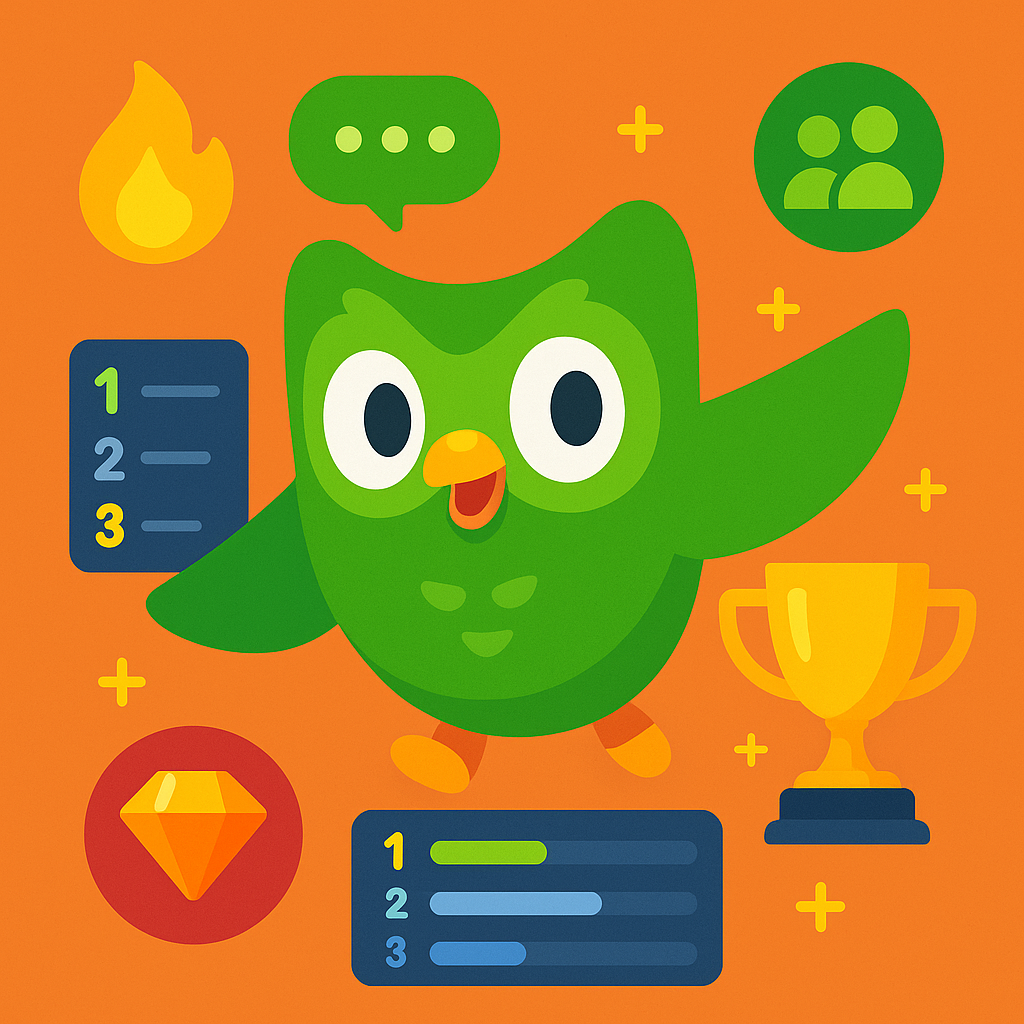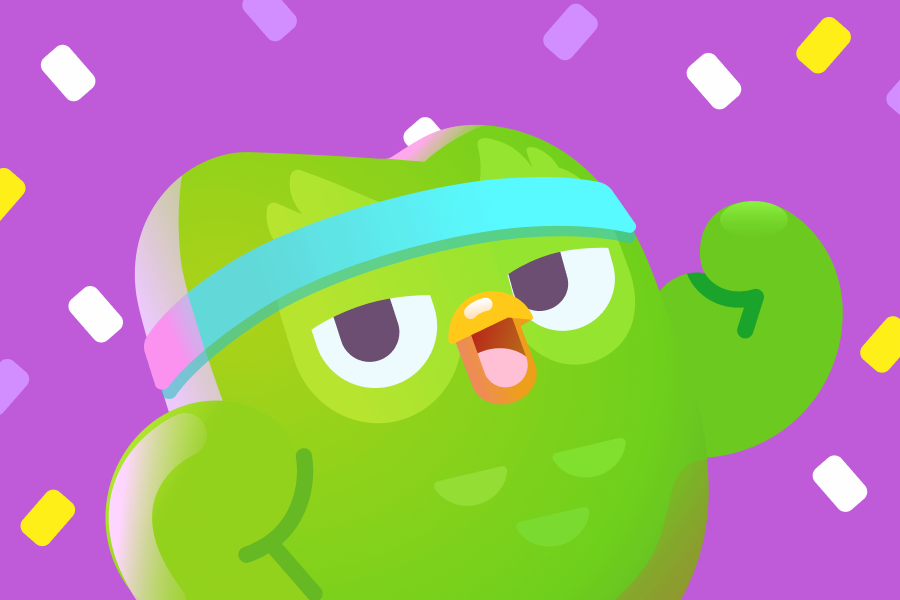The Weird Psychology of Duolingo (And How It Could Change Your Business)
Thursday November 20, 2025

A few weeks ago, I decided to resurrect my long-dormant German skills.
I say "skills". I did GCSE German over 30 years ago, and to be honest, it's been gathering dust next to my Kylie Minogue LP and Walkman ever since.
But my brother-in-law lives in Germany, and every time we visit, I feel a bit like a tourist in my own family. So I downloaded Duolingo, determined to at least master buying some bread and locating the nearest toilet.
And now I can’t stop.
Seriously. I’m logging in every single day. I’m chasing daily streaks like a dog after a tennis ball. I’ve somehow become emotionally invested in my place in the league tables. I’m doing friend quests. (Yes, that's a thing.)
Why? I’ve no idea. No one cares. There are no prizes. I don’t even know these other people.
But I care.
And that, my friend, is the dark magic of gamification.

It’s Pointless. And It Works.
Duolingo is absolutely dripping with gamification.
Daily streaks. XP points. Gems. Leaderboards. Quests. Leagues. Little animations that celebrate your tiniest wins like you’ve just conquered Everest in flip-flops.
It’s all, frankly, a bit silly.
And yet...
Duolingo is widely recognised as the world’s leading language‑learning app. In 2024 it brought in about $748 million in revenue, and had over 116 million monthly users. It’s growing over 40% year-on-year.
And while they’ve nailed lots of things - slick User Experience, bite-sized lessons, a cute owl that guilt-trips you better than your grandma – I believe it’s the gamification that keeps people coming back.
Because gamification, done well, creates:
- * Engagement
- * Loyalty
- * Trust
- * Habit
- * Community
- * Even virality
That’s a lot of ROI for some animated fireworks and pretend gemstones.
So What Does This Have to Do With You?
Well, if you run a small business, especially one that involves customers doing something repeatedly - like booking sessions, coming to classes, placing orders, or engaging with your content - gamification might just be your new best friend.
You may already have some gamification bakes in to your business – a lot of businesses do, sometimes without even really realising that that’s what they are doing.
But I bet you don’t have as much as DuoLingo. They’ve taught us that you can never have too much!
So here are some ways you could dabble in it (without needing a development team the size of Google):
- The Children’s Class Provider
- * Award badges to kids for milestones: 5th class, 10th class, first performance.
- * Reward parents with discounts or entries into a prize draw after certain streaks.
- * Publish fun leaderboards ("Top Ten Attendance Champions this Term!").
- The Personal Trainer
- * Points for completing workouts, hitting goals, or sharing progress.
- * Different "levels" of clients (Rookie, Warrior, Beast Mode).
- * Monthly challenges with mini rewards (like a smoothie voucher or free class).
- The Nursery or School
- * Celebrate attendance or behaviour streaks (think sticker charts 2.0).
- * Use digital badges for achievements: "Kindness King/Queen", "Lunchtime Legend".
- * Turn parent engagement (e.g. attending meetings or completing feedback forms) into a game.
- The Family Day Out Business
- * Offer collectable digital badges for each visit or trail completed.
- * Hidden QR codes around the venue that unlock fun facts or discounts.
- * Reward social media shares with points or perks.
What about Toddle About & Book That In?
Well, here’s what I’m playing with:
For Toddle About, we started our Top of the Tots lists based on reviews not long ago… which we will be improving soon and is still gaining some traction. But that’s gamification – I didn’t realise that at the time.
I’m also thinking about gamifying our advertisers’ campaigns. For example, perhaps:
- * A leaderboard based on response rates, creativity, CTA power, or use of tracking links.
- * Badges for milestones like "Best Use of Free Extras" or "Ad That Made Me Spit Out My Tea".
For Book That In, we could maybe add:
- * A point system for key actions: setting up an account, making bookings, linking Stripe, getting reviews.
- * Loyalty points for longevity, or status tiers: Beginner, Paduan, Master, Legend.
- * Points unlock perks, features, or just bragging rights.
Would it work? I don’t know yet (I’d love to hear your thoughts!)
But I do know that we humans are funny creatures.
We love points.
We love streaks.
We love being part of something.
Even if it’s utterly pointless.
Final Thought: Play to Win
This isn’t about manipulating your customers with bells and whistles.
It’s about understanding how people tick - and creating tiny moments of joy and reward that keep them coming back.
You don’t need to build the next Duolingo. You just need to make your experience feel a little more fun.
And if you get it right? 2026 might just be your most engaging year yet.
Now if you’ll excuse me, I need to go defend my league position from a 12-year-old in Tokyo.
Till next time,
Tim
About The Author
 Tim Freed is the Co-Founder of both Toddle About and Book That In.
Tim Freed is the Co-Founder of both Toddle About and Book That In.
Having built and managed a 50-strong team of door-to-door sales people in his early 20s, he joined the corporate world and built a multi-million pound recruitment team. Then Tim turned to entrepreneurship - founding Toddle About in 2010, which is now a thriving franchise business. He went on to launch Book That In in 2017 with his business partner, Alec Wadey, which is now one of the fastest growing online booking systems in the UK.
Tim is always learning and striving to improve and loves nothing more than sharing his hard-won knowledge and experience in sales, marketing, leadership and entrepreneurship with other business owners to help them on their own journeys.